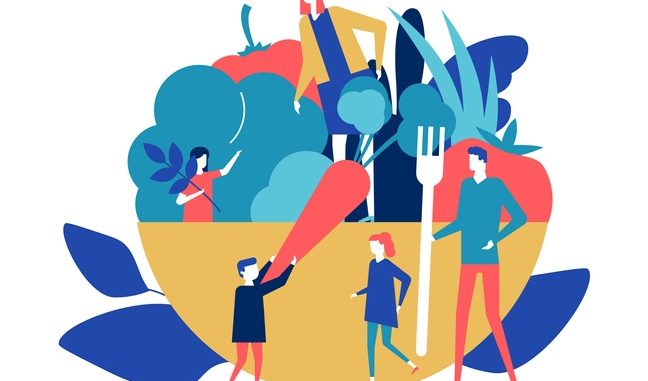
From supporting our mental health, to its impact on the planet, we look beyond food’s physical composition to see the different roles it plays in our lives
CREDIT: This is an edited version of an article that originally appeared on Happiful
Whether you’re a foodie who loves trying multiple dishes at fancy restaurants, or someone who sees food as nothing but fuel, we all have one thing in common – we need to eat to survive. This simple fact makes food an integral part of our lives.
The meals we eat frame our day, bring us joy and connect us with others. Sitting around a table of food with friends is a beautiful way to create a sense of community and belonging. Eating a varied diet can nourish both body and mind, helping us feel as good as we possibly can.
Understanding the physical health benefits of different foods is, of course, something we advocate; the more informed we are, the more agency we have over our choices. Perhaps, though, it’s time we take a step back and look at food from every angle. Seeing the different roles diet plays can help us assess our own eating habits in a more holistic way.
The mental health role
We are starting to learn more about the importance of eating well for mental health and, specifically, how gut health ties in with this. Eating a diet rich in nutrients and fatty acids helps the neurons in our brain communicate better and a recent study has found that increasing the amount of fruit and vegetables we eat lowers the risk of clinical depression.
Nutritionist Resource member and nutritionist Sarah Hanratty expands on why gut health is so important for mental wellness. “Certain strains of gut bacteria have the capacity to create inflammation and could influence mental health via the vagus nerve. Current research is pointing to a strong relationship between chronic inflammation and depression.”
Eating well can be a form of self-care, giving your body and mind what they need to thrive. Learning which foods help you feel better mentally, and which foods make you feel worse, is a great place to start.
The environmental role
The way we’re currently eating is making a big impact on the planet – and not in a good way. Food and agriculture account for 30% of global greenhouse gasses and are considered the largest driver of environmental degradation and climate instability.
As we’re becoming more aware of climate change and plastic pollution, more of us are making changes for a more sustainable planet. From reusable coffee cups and metal straws, to electric cars, it’s noticeable that our society is wising up.
One of the best things we can do for our planet is to reduce our meat intake. This can be as simple as replacing certain meals with vegetarian alternatives (taking a flexitarian approach) or following the ‘planetary diet’. “The key purpose behind creating this diet is to save lives and feed 10 billion people, all without causing catastrophic damage to the planet.
“Developed by 37 of the world’s top scientists at EAT-Lancet, the planetary diet acknowledges the changes we can make in our meals to support sustainability, while still getting the nutrients we need.”
For some, the threat to the planet is enough for them to become fully vegan. If you are thinking about becoming a vegetarian or vegan, but aren’t sure how to ensure you’re getting enough nutrients, you may want to consult a nutritionist.
Food is multifaceted. It can bring so much joy to our lives if we learn how to eat in a way that benefits us and the planet – but, balance is essential here.
By all means consider the impact your food is having on your health, and the world around us, but don’t punish yourself for buying plastic-wrapped convenient food from time-to-time or enjoying a family-sized bar of chocolate when cravings hit. We need to eat in a way that’s not going to induce guilt every mealtime.
The better your relationship is with food, the happier you’ll be exploring every element. To learn more about the ways food impacts us, visit Nutritionist Resource and learn more from a nutrition professional.
Don’t forget to follow us on Twitter, like us on Facebook, or connect with us on LinkedIn!


Be the first to comment